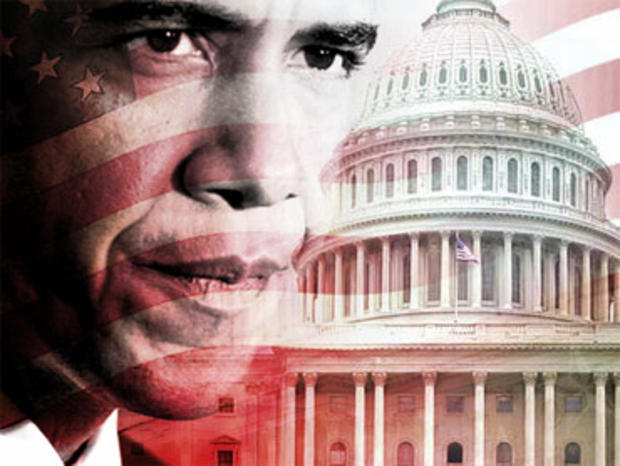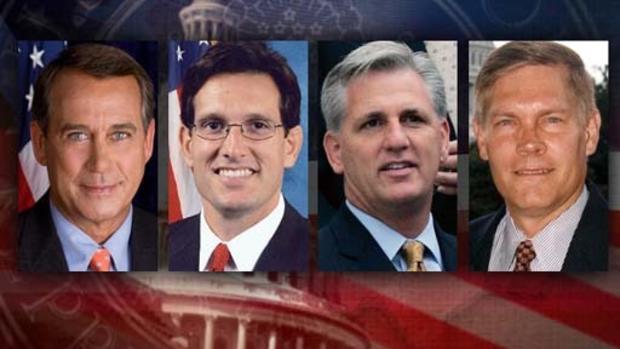Why Democrats Lost the House to Republicans
Congressional Democrats suffered their worst electoral defeat in decades, losing more than 50 seats in the House of Representatives. Preliminary CBS News exit polls show that these results were fueled primarily by a depressed turnout among Democratic base groups, independents leaning Republican and voter backlash against President Obama and his handling of the economy.
Based on those exit polls, here's how the Republicans took back the House:
The Democratic Base Stayed Home
Core Democratic groups stayed away in droves Tuesday, costing Democratic House candidates dearly at the polls.
Hispanics, African Americans, union members and young people were among the many core Democratic groups that turned out in large numbers in the 2008 elections, propelling Mr. Obama and Democratic House candidates to sizable victories. In 2010, turnout among these groups dropped off substantially, even below their previous midterm levels.
Voters under the age of 30 comprised 18 percent of the electorate in 2008 and nearly 13 percent in 2006 but only made up 11 percent of the electorate in 2010. The share of voters from union households dropped from 23 percent in 2006 and 21 percent in 2008 to 17 percent in 2010. African Americans made up 13 percent of the electorate in 2008 but fell to 10 percent in 2010. Such apathy likely cost the Democrats House seats as voters in each of these groups cast ballots for Democratic House candidates by at least 15 point margins.
Independents Turned to the Right
Independent voters without loyalties to either of the major political parties swung dramatically toward the Republican Party in 2010, propelling Republican House candidates across the country to victory.
In the last two House elections, independent voters played a crucial role in the Democratic victories. Fifty-seven percent of independents preferred Democratic House candidates to Republican House candidates in 2006 while 51 percent of independents voted Democratic in 2008.
In 2010, independent voters comprised 28 percent of the electorate. They cast 55 percent of their ballots for Republican House candidates. Independent voters had not cast this great a proportion of votes for Republican House candidates since the last time the House flipped to the Republicans in 1994.
Disapproval of Performance from Obama and Congress
Mr. Obama proved to be a major liability in the 2010 election. Fifty-five percent of voters disapproved of the way the president is handling his job, including 58 percent of independents. Of those who disapproved of Obama, 86 percent voted for a Republican House candidate. Even more to the point, 37 percent of voters overall, as well as 37 percent of independents, claimed a reason for their House vote was to express opposition to Mr. Obama.
Voters were no happier with the Democratic-controlled Congress. A whopping 72 percent of voters disapproved of the way Congress is handling its job, including majorities of Republicans, Democrats and independents. Of those who evaluated Congress negatively, 64 percent preferred a Republican House candidate to a Democratic House candidate in their local race.
Unhappiness with Obama's Policy Approaches
The exit polls show that voters have become disillusioned with Democratic policy prescriptions for the most pressing political problems. Nearly three quarters of voters (74 percent) are dissatisfied or angry the way the federal government is working. More than six-out-of-10 voters (61 percent) think the country is off on the wrong track. And 51 percent of voters think Mr. Obama's policies have hurt the country. Not surprisingly, sizable majorities of all these groups preferred Republican House candidates to their Democratic counterparts.
Nowhere is this dissatisfaction more strongly felt than with Mr. Obama's handling of the economy, the issue viewed as the most important facing the country by 62 percent of the midterm electorate.
In the 2008 election, there was considerable optimism among voters concerned about the economy that Mr. Obama would be able to right the ship. Exit polls that year showed that among the 48 percent of voters who thought the economy was poor, 65 percent preferred Mr. Obama to McCain for president. Similarly, of the 55 percent of voters who were worried that the current economic crisis would harm their family's finances in the next year, 65 percent voted for Mr. Obama.
By 2010, voters had become disillusioned with Mr. Obama and the Democratic-controlled Congress with many thinking they are part of the problem rather than the solution. Nearly a quarter of voters (23 percent) now believe that Mr. Obama is more to blame for the current economic problems than former President George W. Bush or Wall Street bankers. Nearly two-thirds of voters (65 percent) believe the economic stimulus package has hurt the economy or made no difference.
Voters pessimistic about the economy now feel that Republicans are the best option for a recovery. Of the 54 percent of voters who rate the national economy as poor, 65 percent voted for a Republican House candidate. Of the 37 percent of voters who rate the economy poorly, 70 percent preferred a Republican House candidate to a Democratic House candidate.
Ominous Signs For Obama In 2012
How Boxer Bucked a National Trend in California
Why Key Midwest Swing States Flipped to the GOP
Harry Reid Wins: How He Did It
Who Are the Tea Party Supporters?
Mixed Midterm Messages
The 2010 midterm elections show an electorate frustrated by the problems facing the country and Mr. Obama's efforts to ameliorate them.
Unfortunately, voters are seriously divided about the next steps government should take in the upcoming years.
Thirty-nine percent want the highest priority for the next Congress to be reducing the budget deficit, compared to 37 percent who want Congress to increase spending to create jobs and 18 percent who want Congress to focus on cutting taxes.
When asked how Congress should vote on the Bush-era tax cuts set to expire at the end of this year, 39 percent supported continuing them for all while 37 percent supported continuing them only for families who earn less than $250,000 a year. Only 15 percent thought the Congress should let them expire for all.
Voters are also split on what do with the landmark health care bill passed earlier this year. Much of the law has yet to go into effect, yet 48 percent of voters think it should be repealed while 47 percent think it should be left as is or expanded.
The CBS News exit polls were conducted by Edison Research for the National Election Pool. Results are based on 17,504 voters interviewed either after exiting the polls across the nation or by telephone if they voted early. They have a margin of error of plus or minus 2 percentage points.
Samuel J. Best is an associate professor of political science at the University of Connecticut and the former director of the Center for Survey Research and Analysis. He is the author of numerous books and articles on public opinion and survey methods. He holds a Ph.D. in political science from the State University of New York at Stony Brook.

